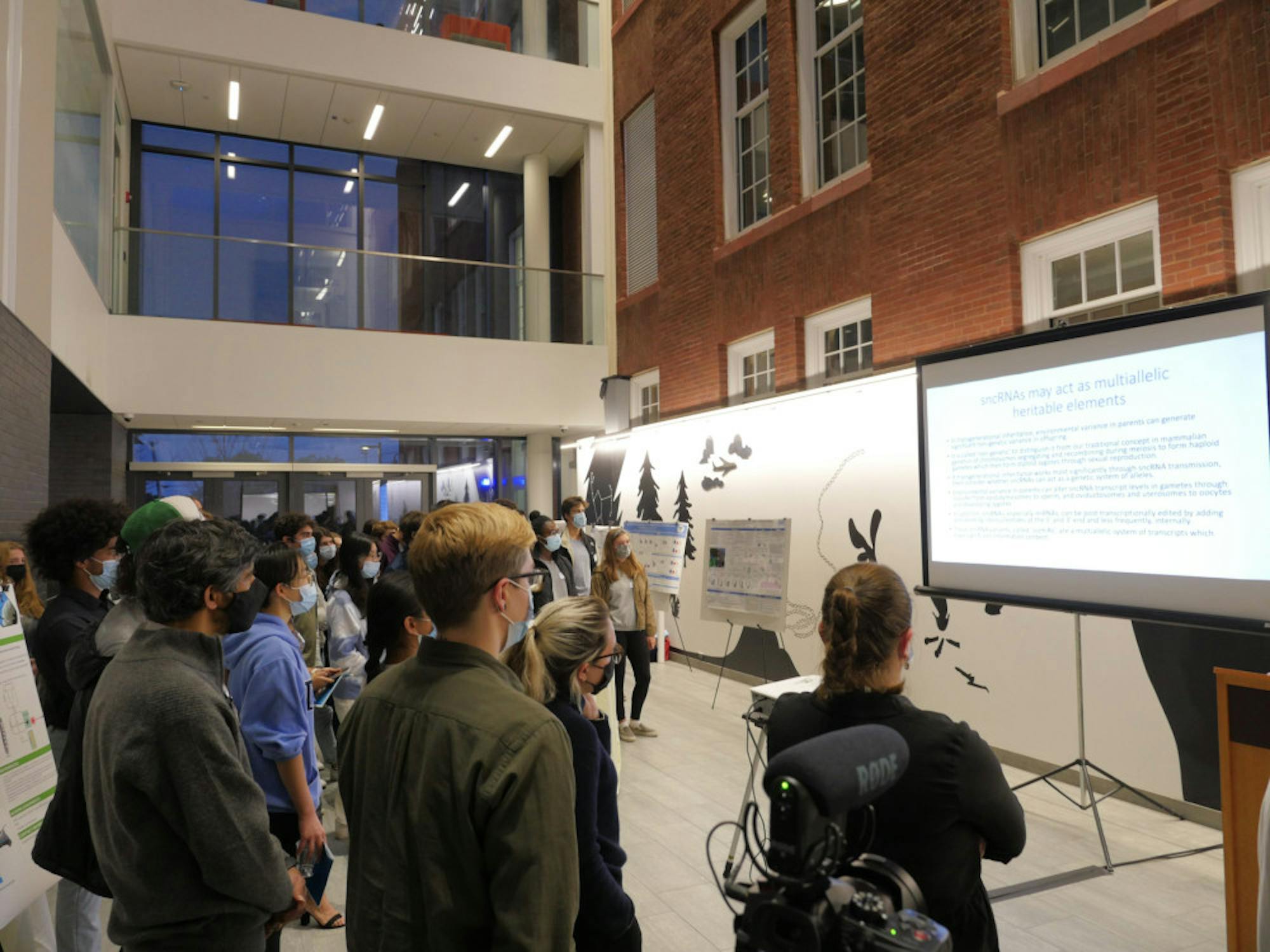Although Tufts does not have a neuroscience major, students are finding alternative ways to get involved and build connections in the field. NeuroNetwork, the largest undergraduate neuroscience organization on campus, aims to expose interested undergraduate students to neuroscience by building relationships with labs and students pursuing neuroscience at the Tufts Graduate School of Biomedical Sciences.
NeuroNetwork held their largest event of the semester, the fall open house, on Oct. 29 in the Science and Engineering Complex atrium. The open house included poster presentations by graduate students and featured a presentation by keynote speaker Anthony Monaco,Tufts University president and geneticist. The organization typically hosts a spring open house at the Boston campus as well.
Senior Sanjana Puri, co-president of NeuroNetwork, explained the importance of these events for students looking to get a start in neuroscience.
“There isn't a neuroscience major or minor at Tufts, and I think a lot of students come in interested in learning about neuroscience and then they find there isn't really anything related to neuroscience,” Puri said.
MD/PHD candidate Jacob Klickstein had no exposure to neuroscience in his undergraduate years at Tufts, and is appreciative of the role NeuroNetwork plays.
“When I was invited to come to NeuroNetwork for the first time last year, I was like, ‘This is a great club, a great experience,’” Klickstein said. “I love to be able to get other undergraduates excited about neuroscience and have them have some exposure to what is going on, especially other labs at Tufts.”
Planning the organization’s first in-person event since the pandemic started proved challenging, since members who had planned in-person open houses in the past have since graduated, according to Puri.
Still the presentations at the open house left Cole Chalfant, a sophomore studying psychology on the pre-medical track, with an appreciation for the effort that goes into the research process.
“I noticed how in-depth this research is and how much of a difference they can make,” Chalfant said. “One thing that I did see was the stages that research goes through, how it starts at a super small level with testing on mice, and then eventually the goal – this is a common trend among a lot of them — was to work their way up to be applicable to humans and the human brain.”
The highlight of the fall open house event was a presentation by Monaco, who presented recent research on the co-evolution and inheritance of RNA and DNA pools. While introducing Monaco, Puri highlighted his distinguished career, including his work leading research on the discovery of the gene responsible for X-linked Duchenne muscular dystrophy.
Monaco’s research has widespread implications for the future of evolution and disease.
“Humans have become the dominant species with rapid population growth, reduction in biodiversity of other species and heating of the planet,” Monaco said at the event. “Humans are interacting more frequently with other species and their RNA pools. When this occurs with increased frequency we know the result: we get a pandemic.”
To conclude the presentation, Monaco called for more resources to study RNA pools and emphasized the potential of this research to illuminate mechanisms of disease.
“The study of the RNA pools should have the same priority for funding and international collaborations which heralded DNA sequencing and the Human Genome Project,” Monaco said. “Only partial answers to the complexity of common disease have been uncovered by an unwavering focus on DNA variation.”
Following Monaco’s presentation, postdoctoral scholar Adam Mullis offered tours of labs in the SEC, including the David Kaplan lab, where he works. Mullis also offered some advice for undergraduates interested in getting involved in research.
“[Be] reasonable about what goes into research — it's very time consuming,” Mullis said. “It's a lot of tedious stuff, but you can get some really exciting new knowledge out of it. [Go] into it with expectations that it may not be fun day-to-day, but in the long term it generates useful knowledge.”
Overall, the event succeeded in generating excitement about the field and its future.
“This field is in such an early stage in general because of how new the technology is,” Chalfant said. “It's really interesting to see all the different researchers and how we'll be able to understand the brain ... so much more in the near future.”
Ben Laddis, a sophomore who attended the open house, left the event feeling excited about research being conducted at Tufts.
“It just made me super optimistic about the future,” Laddis said. “I had not that much of an idea that all of this research was going on at Tufts. It gets me really excited about the future.”
Klickstein offered his own advice to undergraduates, urging them to get experience in research before deciding to pursue it as a career.
“You can Google and read about things all you want, but you're gonna find that reading about something and actually doing it are very different things,” he said.
In order to get started, Klickstein recommended undergraduates reach out to graduate students involved in research who may have more time available than lab principal investigators.
“[Principal investigators] might not get back to you, but it's not because they're insulted or anything like that; they usually just don't have time,” he said. “Often graduate students get super excited that someone else is interested in their work, and they're going to be the ones that are the most honest with you about what it's like to be a grad student.”
Naz Akdilek, a research tech in the Klaus Miczek lab, also encouraged undergraduate students to attend other conferences to get a feel for the work and make connections. She specifically recommended conferences of the Society for Neuroscience.
At the close of the open house, Klickstein echoed the advice President Monaco gave him when he was an undergraduate trying to discover his interests.
“If you find something that you enjoy, you can investigate it, but don’t question it. Just follow it and see where it takes you,” Klickstein said.






